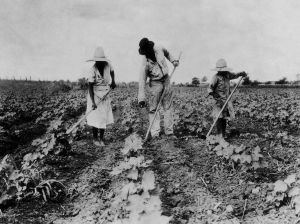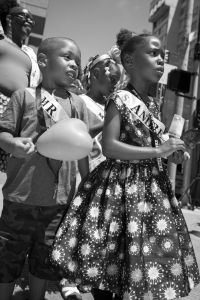(Recorded at Carnegie Hall on June 19, 2019)
Juneteenth marks the day in 1895 when slaves in Texas learned they were free. Abraham Lincoln had issued the Emancipation Proclamation two and a half years earlier, but many states ignored it, and it wasn’t until two months after the Civil War ended that Union troops arrived to enforce emancipation. The 19th of June became Juneteenth as every year growing numbers of African Americans recall with jubilation their own independence day. That spirit resounded through Carnegie Hall in New York City at the 2019 Juneteenth celebration where a packed house gathered to remember and to sing. Bill Moyers was invited to deliver the keynote address.
Transcript
Soledad O’Brien:
As a journalist, it is truly a thrill for me to be able to introduce to you our next speaker, 30 Emmy awards, a Lifetime Achievement Award, a bestselling author, and more than five decades as a renowned journalist and political commentator. And here’s something you may not know about our next speaker. He originally trained for the Baptist ministry. He was ordained in 1954 and he received a Master’s Degree, Master’s of Divinity degree. So please join me in welcoming Mr. Bill Moyers.
Bill Moyers:
Thank you for that welcome. And thank you, Soledad. I’m honored to be here, but I have to be honest and say that when Jim Forbes, my dear friend, my longtime pastor, my, my soulmate and brother in the faith asked me to address what he formerly calls the state of occasion tonight, my first thought was you have lost it, my brother. There’s no need for anyone to do that, Jim, this occasion speaks for itself. If you doubt me, just look around at who’s here. Juneteenth speaks of freedom. That moment 151 years ago, when Union General Granger stood on the balcony of the one time Confederate headquarters in Galveston, Texas – a villa built just five years earlier by slaves – and reading from a document entitled General Order Three, he announced that all slaves are free. And they were. Two and a half years after Abraham Lincoln had signed the Emancipation Proclamation, the word had finally reached the last outpost of the Confederacy. The word had come: let my people go.
One in four Texans owned slaves. Thirty percent of the population were slaves. In all a quarter of a million people could finally shout free at last, free at last, God almighty we’re free at last.
Not quite. In the next sentence of that proclamation, the General declared this freedom involves an absolute equality of rights and property between former masters and slaves. But it wasn’t to be. A few steps from freedom, they met a fierce backlash. A freed black man captured the moment. “I know when peace was declared,” he said, “the slaves were all shouting. One woman was hollering and a white man with a high stepping horse rode close to her and I saw him get out and open his knife and cut her wide across the stomach. Then he put his hat back inside his shirt and rode off light like lightning. The woman was put in a wagon and I never heard more about her.” Over the next three years, whites murdered 400 freed slaves. Some white towns banned the Juneteenth celebration altogether and blacks celebrated secretly in their churches or far from town.
Sometimes they pooled their money to buy a small parcel of land where they could sing and dance and rejoice in relative safety. Less than a year later, Texas held a constitutional convention, for whites only. They knew what they wanted. One delegate summed it up: “The preservation of the white race is the paramount objective of the people of Texas.” From the start, American society was invented on white supremacy. The first Americans brought to Virginia shores 400 years ago, arrived on three slave ships, shorn of their freedom and stripped of their names. They were given white names instead, one of them, we only know as Angela. I thought of Angela the other night when I started reading Toni Morrison’s new remarkable book called The Source of Self-Regard. She has in here quotes from a diary from 1710 to 1712 by a man described as Virginia’s most polished and ornamental gentlemen. Virginia’s most polished and ornamental gentlemen.
Here it is,
2/8: Jenny and Eugene were whipped.
4/17: Anaka was whipped.
5/13: Mrs Byrd was whipped.
3/23: Moll was whipped.

A family of black slaves working on a plantation. Saint Louis (Photo by Mondadori Portfolio via Getty Images)
6/10: Eugene [a child] was whipped for running away and had the bit put on him.
9/3: I beat Jenny.
9/16: I beat Anama.
11/30: Eugene and Jenny were whipped.
12/16: Eugene was whipped for doing nothing yesterday.
7/1: The Negro woman ran away again with the bit on her mouth.
7/8: The Negro woman was found, and tied, but ran away in the night.
9/15: My wife, against my will, caused little Jenny to be burned with a hot iron.
8/22: I had a severe core with little Ginny and beat her too much, for which I was sorry.
8/31: Eugene and Jenny were beaten.
10/8: I whipped three slave women.
11/16: The Negro woman ran away again.
Why did he do it? Because he could. He was white privileged and powerful. It’s in our country’s DNA. Even in the early part of the 20th century, learned men believed that granting rights to blacks was a ghastly mistake. One of them, a professor at Columbia taught that a black skin means membership in a race of men which has never of itself succeeded in subjecting passion to reason and has never, therefore, created any civilization of any kind. And a Princeton professor of note said blacks were un-practiced in any civilization of any kind. And a Princeton professor of note said blacks were excited by a freedom they did not understand and were not ready for participation in public life. That professor went on to become the president of the United States. His name was Woodrow Wilson.
This occasion speaks for itself. Every historic step taken by black people has been met by fierce resistance. The first backlash following emancipation and reconstruction. When Jim Crow laws sought to reverse the outcome of the Civil War. This helps us understand why it took 100 years and one more year from the day President Abraham Lincoln signed the Emancipation Proclamation in 1863 to the day, President Lyndon Johnson, for whom I worked in the White House, signed the Civil Rights Act of 1964.
This helps us understand why it took a full century plus one month from the day in 1865, when General Granger declared equality of rights for freed slaves before the voting rights law of 1965 made it so. You see, even the great achievements of the civil rights movement of the 20th century were met by a massive counter-attack from George Wallace, “segregation now, segregation today, segregation forever.” And a conservative movement that stood athwart history, shouting stop. And now in the 21st century, we are gripped by the third great backlash. This one brought on–

Juneteenth, 2017
This one brought on by the election of the first Black American president. And this backlash has produced a Supreme Court, a United States Senate and a president attempting to whittle away at the voting rights so hard-won over decades.
They believe that on the third backlash, our side is out. Juneteenth says struggle, victory, backlash. Struggle, victory, backlash. Struggle, victory, backlash. Jim Crow has nine lives and a thousand tricks and schemes and he never quits. Juneteenth. Juneteenth tells us it’s a long road to freedom and you can be ambushed anywhere on it. Juneteenth tells us, look out, be alert. Don’t give up. The struggle is never done. Brothers. The struggle, sisters is never done.
Jim Forbes may have forgotten this, but sometime before he asked me to be here this evening, he pulled me aside at a Riverside Church event and asked me a question, almost in a whisper, he asked me, “When democracy dies, when democracy cries, I can’t breathe. How do we answer? How do we answer, Bill? When democracy cries, I can’t breathe.” I couldn’t answer. I was tongue-tied, but now I can. Juneteenth here tonight is the answer. Juneteenth says, tell the truth, strip the whitewash from our history and tell our story.
Because democracy can die of too many lies. Remember Angela and little Ginny and those three unnamed slave women and tell the story about what happened to them that they cannot tell themselves. Tell the truth, tell the story and sing, sing to celebrate freedom. Juneteenth tells us it’s a long, long road to freedom. You have to sing when you’re weary, when roadblocks loom and potholes open. And the devil himself straddles the road across in front of you, pitchfork raised and leering. You have to sing, even if you can’t carry a tune. Even the flattest note can carry hope.
Let’s sing.
Soledad O’Brien:
Ladies and gentlemen, we invite you to sing with the Harlem Chamber Players and the Juneteenth Mass Choir, featuring Ebony Ecumenical Ensemble. As they perform, Lift Every Voice and Sing. Please stand. If you are able, the song lyrics are inside your playbill. Thank you.

